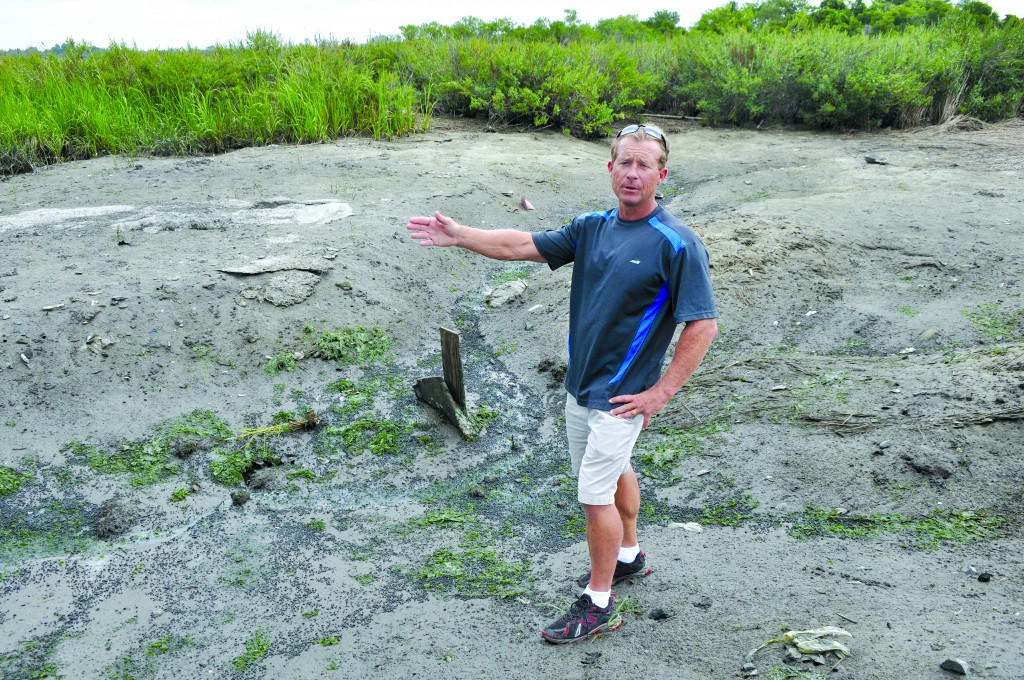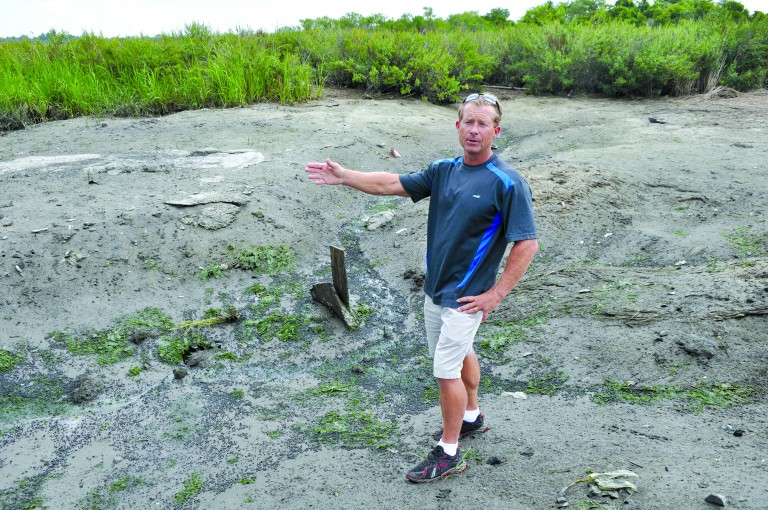
Dan Mundy Jr., Vice President of the Jamaica Bay Ecowatchers, stands next to the broken pipe near the West Pond at the Jamaica Bay Wildlife Refuge. The damaged pipe has allowed saltwater from Jamaica Bay to flow through to the freshwater ponds located at the Wildlife Refuge. Forum Newsgroup photo by Luis Gronda.
A broken pipe in a local body of water has environmentalists concerned about when it will be fixed and the amount of damage it has done and could do in the future.
The damaged pipe line runs through both the saltwater and freshwater ponds of the Jamaica Bay Wildlife Refuge in Broad Channel. If it was working properly, the pipe and valve system at the bay would filter out the salt in the water, allowing for the creation of the freshwater ponds and attracting wildlife like freshwater birds.
Now, with the busted vessel at the bay during a high tide, the saltwater floats into the freshwater pond. The pipe is unable to filter the water, essentially creating two saltwater ponds.
Dan Mundy Jr., Vice President of the Jamaica Bay Ecowatchers, which is an organization that advocates for protecting the bay, said that their main concern is that if the pipe isn’t fixed, the wildlife refuge will lose its unique situation of having two different ponds so close to each other as well as drive away the wildlife that come to the area for the freshwater.
“There’s nothing unique about it and it’s not functioning as it was planned and designed for,” He said.
According to John Warren, a spokesman for the National Park Service (NPS), the problem was first discovered in 2010 when the pipe valves of both the East and West ponds were found to be malfunctioning.
Warren said that the pipe at the East Pond was fixed in January 2012 after a failed attempt in 2011. The park service was able to fix that pipe and freshwater levels returned to normal, though he did say that there is a concern that the valve in that area has reached the end of its lifespan and could fail again in the future.
As for the valve that’s currently broken at the West Pond, Warren said that the pipeline failed in winter of 2012. Attempts to fix the pipe were unsuccessful sothey sealed it, preventing more saltwater from filtering in, but this solution didn’t allow them to control the water levels of the pond.
He added that a January 2012 test of the water salinity at West Pond revealed that it is now 26 parts per thousand (PPT), which is close to the water at the bay itself, which is 28 PPT. Historically, the West Pond water had measured at around 4 to 7 PPT.
In comparison, the East Pond, where the pipe was fixed, measured at 3.5 PPT during that same test, according to Warren. In the past, it averaged 2 to 3 PPT.
Mundy Jr. and the ecowatchers have been calling for funding to come from either a government agency, like the Department of The Interior, or from within the wildlife refuge itself.
One politician who has been petitioning for that funding is Congressman Bob Turner (R-Queens).
Joshua Spielman, a spokesman for the Congressman, said that Turner’s office have been working on the issue with the ecowatchers and NPS, including Turner himself meeting with NPS Director Jonathan Jarvis in May of this year.
He said that it would cost about $1 million to replace the pipes at both East and West ponds and that the Gateway National Recreation Area, which is part of the NPS, told Turner’s office that fixing the pipes is in their plans. But that depends on securing the funding for the project, which neither NPS nor Gateway can currently afford, Spielman said.
“I will continue to push to make this a budget priority for the National Park Service and the President. My office has been working on this issue since the Jamaica Bay Ecowatchers brought it to my attention, and I will continue to work with all of the offices involved to resolve the issue,” Turner said in a statement.
Mundy Jr. said that they would like to see the funding for the pipe secure this year and construction for it to begin sometime next year. He added that once that happens, the West Pond should be able to become a freshwater pond again.
“It’s definitely attainable and that’s our goal,” he said.
By Luis Gronda

